|
The Top 10:
The Greatest Brass Band Contest Composers
Everyone has a favourite brass band composer. From
the finest solo players in the best bands in the world, to the humblest
third cornet player in a fourth section band, everyone has a favourite
someone who’s music they like to play. With this in mind then,
we cast our critical eye over the vast list of composers who have
written original music for the lifeblood occasions that symbolise
the brass band movement to the general public…….. the
major contests.
Our criteria
Our criteria were therefore quite strict, and we had to be quite
selective in the way in which we made our final choice. We only
chose from those composers who wrote original works, so arrangements
by the likes of Frank Wright are excluded from the list, whilst
those composers who were eligible had to have had at least two separate
works chosen as set works at the National Finals, British Open,
European Championships and the All England Masters - so the likes
of Wilfred Heaton, with only his immense “Contest Music”
had to be excluded as well. Finally, we looked at the thorny question
of what indelible mark those compositions had on the movement as
a whole and did they develop, enhance or radically change the perception
of what a brass band could or couldn’t perform. Difficult
eh? With these questions in mind, here is the 4BR list of the “Top
10 Brass Band Contest Composers of All Time”.
If you agree or disagree with us, why not let us know your list?
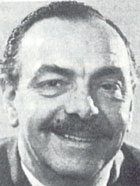 1.
Gilbert Vinter 1.
Gilbert Vinter
Without Gilbert Vinter there would have been no Wilby, no Gregson,
no Sparke. Without Gilbert Vinter the brass band movement would
have died of musical boredom – suffocated by blandness, lack
of invention and foresight, killed by parochialism and narrow mindedness.
The early 1960’s were a monochrome time for the brass bands;
grey and uninteresting, a diet of second-rate original compositions
and unimaginative arrangements of overtures – Gilbert Vinter
changed all that forever.
With a series of breathtaking pieces that combined vibrant colours
and moods, explored new textures, had wit and darkness, yet were
crammed full of great tunes, new ideas and technical challenges,
Vinter changed the course of brass composition. In the end he was
cruelly treated by the so-called “establishment” over
“Spectrum”, yet every new generation of brass band lover
owes him the greatest debt of gratitude imaginable. A man touched
by genius.
Test Pieces used at the Major Championships: 6 pieces used 7 times.
British Open: John O’ Gaunt – 1968; Spectrum –
1969; James Cook – Circumnavigator – 1974; Variations
on a Ninth – 1981; Salute to Youth – 1985.
National Finals: Variations on a Ninth – 1964; Triumphant
Rhapsody - 1965
European Championships: None
All England Masters: None
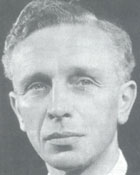 2.
Eric Ball 2.
Eric Ball
Many people would think it sacrilege that the great Eric Ball doesn’t
top our list. A man who bestrode the movement like a colossus throughout
his life, his influence extends farther than just his amazing list
of compositions used at the major championships. The man responsible
for some of the greatest works ever performed by bands at contests,
his compositions remain central pillars to the development of brass
band repertoire. From “Resurgam” to “The Wayfarer”
– he pieces displayed immense musicality and technical brilliance.
His works are inspirational in their content, although in general,
musically conservative in outlook and quiet strict in format. Eric
Ball was also equally skilled in pastiche and arrangements as both
his “Festival Music” and his skilled adaptation of “Checkmate”
showed. He was a man of his time and a man of greater convictions
and beliefs. His music gloriously reflected both and we as a movement
are the better for them.
Test Pieces used at the Major Championships: 11 pieces used 13
times.
British Open: Salute to Freedom – 1946; Resurgam –
1950; The Conquerors – 1951; Tournament for Brass –
1954; Sunset Rhapsody – 1958; The Undaunted – 1959;
Main Street – 1961; Festival Music – 1971.
National Finals: Festival Music – 1956; Journey Into Freedom
– 1967; A Kensington Concerto – 1972; Sinfonietta –
The Wayfarer - 1976
European Championships: Journey Into Freedom - 1982
All England Masters: None
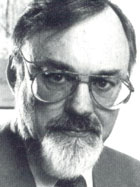 3.
John McCabe 3.
John McCabe
Sometimes an individual voice can be so different that it can never
be copied or mimicked – and this is the essence perhaps of
John McCabe’s music. An immensely talented pianist he came
to brass bands in the late 1960’s and has since used his unique
sense of musicianship to produce works of staggering beauty –
superbly constructed compositions that draw inspiration through
tonal colours, timbres, abstract patterns, multi layered themes
and phrases.
At first, his work (“Images” especially) was thought
too avant garde, yet by “Cloudcatcher Fells” the movement
realised that here was a composer of the rarest gifts as his works
explored musical territory that had rarely been encountered - this
immense work is perhaps one of the most evocatively beautiful compositions
for brass ever. In 1994 “Salamander”, further enhanced
his reputation, whilst in 2002 his “Maunsell Forts”
will once more engage and challenge both the player and the listener.
A dignified and immensely serious composer.
Test Pieces used at the Major Championships: 3 pieces used 6 times.
British Open: Cloudcatcher Fells – 1992; Salamander –
1994; The Maunsell Forts – 2002.
National Finals: Cloudcatcher Fells – 1985.
European Championships: Salamander - 1997
All England Masters: Cloudcatcher Fells - 1989
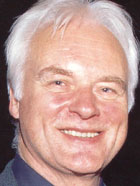 4.
Elgar Howarth 4.
Elgar Howarth
In the 1970’s Elgar Howarth offered the brass band world
the greatest opportunity to explore and develop its repertoire than
possibly any other composer since the Second World War. That we
didn’t take up the offer says so much about us, and goes some
way to explain why we still haven’t been able to access the
talents of composers such as Turnage, MacMillan or Birtwistle to
any significant degree.
Just the two works – but what works they are. Eric Ball described
his “Fireworks” as “fun… but bandsmen weren’t
prepared for it. If they had listened to Prokofiev, Shostokovitch
or even Berlioz, they wouldn’t have thought it strange in
any way. But as a whole, bandsmen didn’t listen to many composers
like that. It had a sort of sardonic wit which I liked enormously,
a sort of French sparkle to it.”
By the time of “Songs for B.L.” the narrow-mindedness
of the “establishment” had become almost offensive and
he became a peripheral figure. Perhaps the greatest compositional
loss ever – and the movement must take all the blame.
Test Pieces used at the Major Championships: 2 pieces used twice.
British Open: Fireworks – 1975.
National Finals: Songs for BL – 1995.
European Championships: None
All England Masters: None
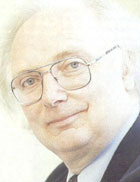 5.
Philip Wilby 5.
Philip Wilby
At the beginning of the 1990’s, the brass band movement was
in desperate need of new composition blood. The British Open in
particular was in need of a musical transfusion as in previous years
the contest had vacillated without ever being able to make up its
mind of what compositional direction it needed to take. Wilby changed
all this – first with his amazingly popular and enjoyable
“Paganini Variations” and then at the Nationals, the
equally popular “New Jerusalem”.
The banding world thought it had found its saviour and set about
rapaciously devouring his output. The big works followed and the
composer’s musical signature became clear. We should have
left him alone though, for within a decade the rich seam of inspiration
was seemingly exhausted and by 2002 and the Masters we had to make
do with “Atlantic” – a second division Wilby work
at best. The composer had decided to call it a day, but it was the
banding movement that had possibly forced his hand. Sometimes less
is more and we will be the poorer for trying to have too much of
a good thing in too short a space of time.
Test Pieces used at the Major Championships: 7 pieces used 9 times.
British Open: Paganini Variations – 1991; Masquerade –
1993; Revelations – 1995; Dove Descending 1999
National Finals: The New Jerusalem – 1992; Masquerade - 2002
European Championships: None
All England Masters: Paganini Variations – 1995; Jazz –
1997; Atlantic - 2002
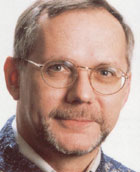 6.
Philip Sparke 6.
Philip Sparke
Philip Sparke was still at the Royal College of Music studying
piano, trumpet and composition when the likes of “Fireworks”
revolutionised the banding scene, but as Howarth’s compositional
influence died away, Sparke became the new torchbearer and from
1977 onwards became the brass band movements leading, and most progressive
composing voice.
A tremendous series of works flowed from his pen – from the
loquacious “Year of the Dragon” to his immense “Harmony
Music” and latterly his beautiful “Tallis Variations”.
His ability to combine challenging technique with an innate sense
of tunefulness makes his works rewarding to both the player and
the listener, whilst he has continued to push the boundaries of
brass writing in many directions.
His style is evident; open, clear and concise and it has proved
a winning combination, so why change? 25 years and still going strong.
Test Pieces used at the Major Championships: 7 pieces used 8 times.
British Open: None
National Finals: Harmony Music – 1987; Between the Moon and
Mexico - 1998
European Championships: The Land of the Long White Cloud –
1980; The Year of the Dragon – 1986; A London Overture –
1991; Tallis Variations - 2000
All England Masters: Harmony Music – 1991; Cambridge Variations
– 1992;
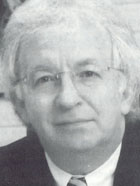 7.
Edward Gregson 7.
Edward Gregson
1977 was the year of the Jubilee and Punk Rock – but it was
also the year of “Connotations” and the emergence of
Edward Gregson as one of the most powerful musical voices in the
banding world.
Gregson was not unknown, many of his early works such as “The
Plantagenets” had been warmly received, but it was “Connotations”
that explored the extensive use of percussion and driving rhythmic
pulses that set him and it apart. It set the tone for his development
as a composer and substantial works such as “Dances and Arias”
followed, although “ Of Men and Mountains”, perhaps
his finest brass band work, has been criminally overlooked as a
set work for the big occasions.
Gregson has become something of a father figure, yet his works
have possibly not been utilised as much as they deserved to be and
we have had to be content with occasional works of importance away
from the contesting field to remind us how fine a composer for brass
he is.
Test Pieces used at the Major Championships: 2 pieces used 5 times.
British Open: Connotations – 1983.
National Finals: Connotations – 1977; Dances and Arias –
1984;
European Championships: Connotations - 1988
All England Masters: Dances and Arias - 1998
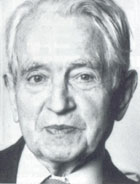 8.
Herbert Howells 8.
Herbert Howells
You may think it strange that Howells, a man whose reputation as
a brass band composer is based on just two pieces makes it onto
our list – especially as those two, “Pageantry”
and “Three Figures” were written some 24 years apart
from eachother and as far back as 1934 and 1960 respectively, but
it is testament to his great gifts that even today his compositions
test bandsmen and women to the full and provide audiences with such
pleasure.
Howells is a quintessential English composer, a man of Gloucester
who was taught by Herbert Brewer and who succeeded Gustav Holst
as Director of Music at St. Pauls School in London. His first love
was undoubtedly the choral field, but his brass compositions are
immense achievements. “Pageantry” remains iconoclastic
– a piece of character, wit, mournful depths, brio and verve
– a test of musicianship and technique even today, whilst
“Three Figures”, although less impressive remains a
deeply satisfying work to both perform and listen to.
At the 2001 All England Masters Championships, his music again
tested the very best bands to the full – taking an enormous
amount of causalities along the way, just as it has done since it
was first performed at the Open of 1934. Age has not wearied it
– and that is perhaps his finest achievement.
Test Pieces used at the Major Championships: 2 pieces used 8 times
British Open: Pageantry – 1934, 1942, 1970; Three Figures
1982
National Finals: Pageantry – 1937, 1950; Three Figures –
1960.
European Championships: None
All England Masters: Pageantry – 2001.
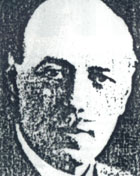 9.
Percy Fletcher 9.
Percy Fletcher
The man who brought us the first original work for a brass band
contest in “Labour and Love” was born in 1879 and was
a most versatile musician who in later years became Musical Director
of Her Majesty’s Theatre, London, and who in his formative
years won compositional prizes for both his military and choral
works .
“Labour and Love” is a landmark composition for the
banding movement and although dated in concept (based on the style
of an operatic selection) it remains the starting point for all
that has followed. “An Epic Symphony” however is in
a completely different class, written in 1926 and with painful echoes
to the horrors of the First World War underlying the music, and
especially its second movement. Even today, it tests the best bands
(although the third movement, the weakest was been dropped at the
Open in 1986) and it has also been “tweaked” by meddling
fingers for no good reason as well.
However, two pieces of note and worthy compositions for the contest
field. Fletcher has served the movement well.
Test Pieces used at the Major Championships: 2 pieces used 6 times
British Open: Epic Symphony – 1976, 1986
National Finals: Labour and Love – 1913; Epic Symphony –
1926, 1938, 1951
European Championships: None
All England Masters: None
 10.
Robert Simpson 10.
Robert Simpson
The late Robert Simpson is a figure misunderstood by many in the
banding movement – a composer who like John McCabe set out
to explore new and challenging musical territory, and a man who
wasn’t hamstrung by the conservatism of the banding world
even though he was brought up in it since his birth in 1921.
His “Energy” was used as the set work for the World
Championships of 1971 and was somewhat coolly received, yet when
“Volcano” was used in 1979 there was a clear distinction
to his work that made it transparent and accessible, even though
it was far removed from what many brass band listeners had been
used to – “Volcano” ended quietly for instance.
“Energy” however was used again at the British Open
of 1980 and at the National Finals of 1991 and the work remains
a fine test of nerve and musicianship, whilst “Volcano”
awaits rediscovery – a hidden treasure.
Test Pieces used at the Major Championships: 2 pieces used 3 times
British Open: Energy – 1980;
National Finals: Volcano – 1979; Energy 1991
European Championships: None
All England Masters: None
© 4BarsRest
 back
to top back
to top
|

